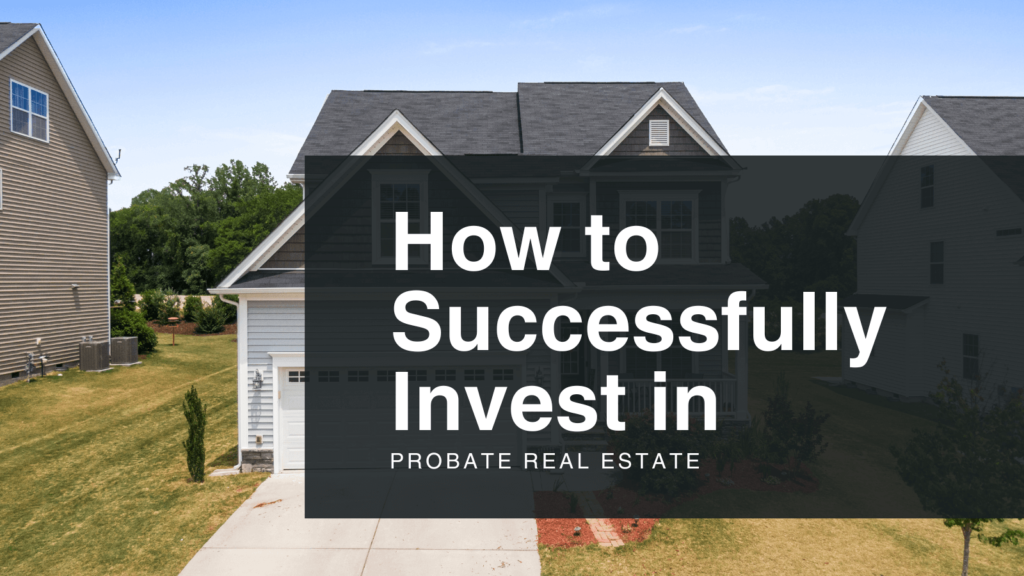 Investing in real estate during probate can be both an intriguing opportunity and a complex challenge. Probate properties often present unique investment potentials, but navigating the legal and emotional landscape requires a well-thought-out approach. This blog will guide you through effective real estate investment strategies during probate, helping you leverage opportunities while managing potential hurdles.
Investing in real estate during probate can be both an intriguing opportunity and a complex challenge. Probate properties often present unique investment potentials, but navigating the legal and emotional landscape requires a well-thought-out approach. This blog will guide you through effective real estate investment strategies during probate, helping you leverage opportunities while managing potential hurdles.
Understanding Probate and Its Impact on Real Estate
Probate is the legal process of settling a deceased person’s estate, which includes distributing assets and paying debts. When it comes to real estate, probate properties are those left behind without a direct heir or explicit instructions in a will. These properties can often be acquired below market value, making them attractive investments. However, the probate process can be lengthy and complex, involving multiple stakeholders and legal requirements.
Key Investment Strategies for Probate Properties
1. Identify Probate Properties Early
What to Do: Monitor probate court records to identify properties entering probate. Many probate courts have public records accessible online, where you can find notices of probate filings and property details.
Why it Works: Early identification allows you to move quickly and potentially negotiate directly with the estate’s executor or heirs, often leading to favorable purchase terms.
Tips:
- Network with Probate Attorneys: Building relationships with probate attorneys can provide early access to probate properties and insider knowledge.
- Public Records Search: Regularly check public records for probate filings to stay ahead of the competition.
2. Understand the Legal Framework
What to Do: Familiarize yourself with the probate laws and regulations in your area. Each state has its own probate process, and understanding these nuances can help you navigate more effectively.
Why it Works: A thorough understanding of the legal framework can prevent delays and legal issues, ensuring a smoother transaction.
Tips:
- Consult a Probate Attorney: Working with a knowledgeable probate attorney can provide valuable insights and ensure compliance with local laws.
- Attend Probate Seminars: Educational seminars on probate can provide valuable information and networking opportunities.
3. Assess the Property’s Condition and Value
What to Do: Conduct a thorough inspection of the property to assess its condition and potential renovation costs. Evaluate the property’s market value and potential return on investment.
Why it Works: Accurate assessment helps you determine the true value of the investment and avoid unexpected expenses.
Tips:
- Hire a Professional Inspector: A detailed inspection report from a professional can reveal hidden issues that might affect your investment decision.
- Market Analysis: Conduct a comparative market analysis (CMA) to understand the property’s value relative to similar properties in the area.
4. Negotiate Effectively
What to Do: Engage in direct negotiations with the executor or heirs to reach an agreeable purchase price. Be prepared to make a fair offer that reflects the property’s condition and market potential.
Why it Works: Effective negotiation can result in acquiring the property at a lower price, increasing your potential profit margin.
Tips:
- Build Rapport: Establish a positive relationship with the sellers to facilitate smoother negotiations.
- Be Transparent: Clearly communicate your intentions and provide a fair offer based on your property assessment.
5. Plan for Renovations and Improvements
What to Do: Develop a detailed renovation plan that outlines necessary improvements, timelines, and budgets. Focus on renovations that will maximize the property’s market value.
Why it Works: Strategic renovations can significantly enhance the property’s appeal and market value, ensuring a higher return on investment.
Tips:
- Budget Carefully: Ensure your renovation budget includes a buffer for unexpected expenses.
- Hire Reliable Contractors: Work with reputable contractors to ensure quality workmanship and adherence to timelines.
6. Leverage Financing Options
What to Do: Explore various financing options to fund your probate property investment. Options may include traditional mortgages, hard money loans, or leveraging existing property equity.
Why it Works: Understanding and utilizing the right financing options can provide the necessary capital to acquire and improve probate properties.
Tips:
- Consult a Financial Advisor: A financial advisor can help you identify the best financing options for your investment strategy.
- Explore Diverse Options: Consider multiple financing sources to ensure you have adequate funds for the investment and any necessary renovations.
Challenges and How to Overcome Them
Investing in probate properties is not without its challenges. Here are common obstacles and strategies to overcome them:
- Legal Delays: Probate processes can be lengthy. Stay patient and maintain open communication with legal professionals to navigate delays effectively.
- Emotional Sellers: Executors or heirs may be emotionally attached to the property. Approach negotiations with empathy and understanding to build trust and facilitate smoother transactions.
- Unexpected Costs: Hidden damages or legal fees can arise. Conduct thorough due diligence and maintain a contingency budget to handle unforeseen expenses.
–
Real estate investment during probate offers unique opportunities to acquire properties at attractive prices, but it requires careful planning, legal knowledge, and strategic execution. By identifying properties early, understanding the legal framework, accurately assessing property value, negotiating effectively, planning renovations, and leveraging financing, you can maximize your returns while navigating the complexities of probate.
If you need help navigating the probate process or require assistance with real estate investments, I’m here to support you. Contact me today, and let’s take the necessary steps together to ensure your investment journey is successful and stress-free.
Angela Carpinella
Realtor and Real Estate Advisor
Cell: (404) 229-8528
Office: (404) 419-3500
Email: Angela.Carpinella@KW.com
Address: 804 Town Boulevard, Atlanta, GA 30319
Let’s Connect!
Together, we can navigate the complexities of probate and uncover lucrative real estate investment opportunities. Let’s get started on building your investment portfolio today.




